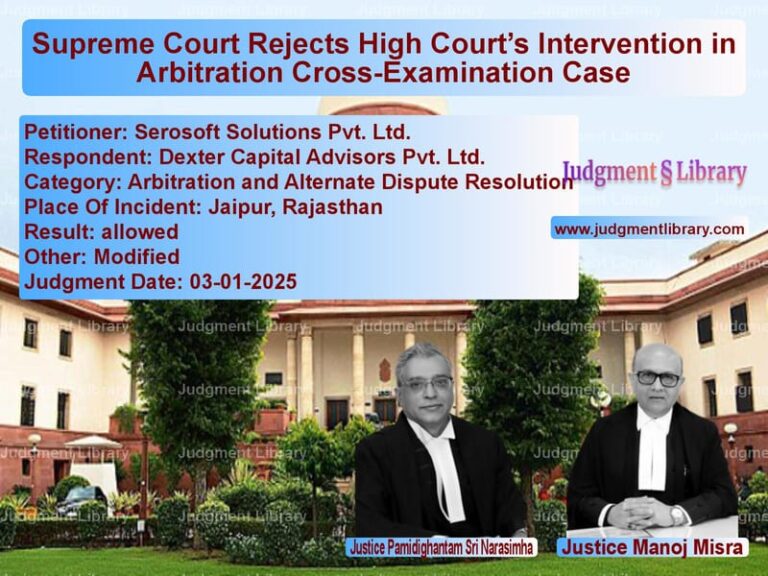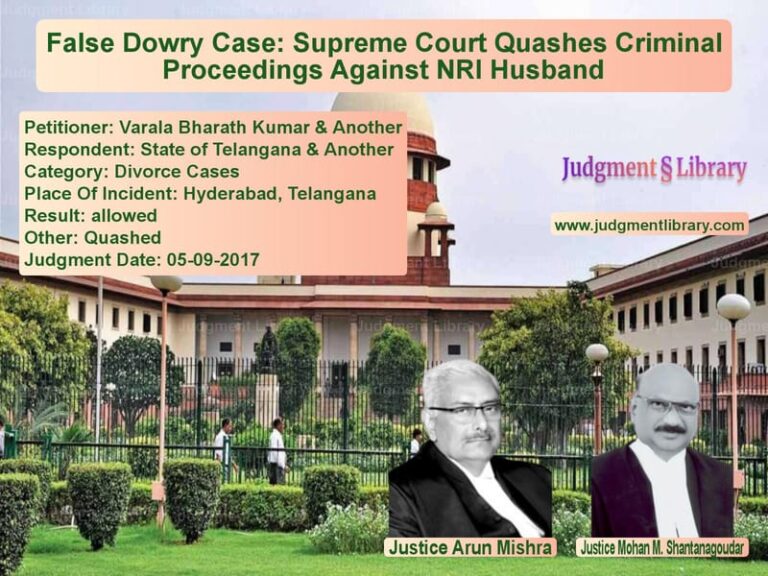Medical College Licensing Dispute: Supreme Court Grants Relief to Annaii Medical College
The case of Annaii Medical College & Hospital vs. Union of India & Anr. is a landmark judgment that highlights the legal complexities surrounding the licensing and regulation of medical colleges in India. The Supreme Court was called upon to decide whether the Medical Council of India (MCI) and the Ministry of Health & Family Welfare had acted within their jurisdiction by debaring the medical college for two years and encashing its bank guarantee.
Background of the Case
Annaii Medical College & Hospital, located in Kancheepuram, Chennai, had applied for permission to establish a new medical college for the academic session 2016-17, with an intake capacity of 150 students. The Ministry granted a conditional Letter of Permission (LOP) based on directives issued by the Supreme Court-appointed Oversight Committee (OC), despite a negative report from the MCI pointing out several deficiencies in faculty, bed occupancy, and medical facilities.
Subsequent compliance inspections conducted by the MCI in November 2016 revealed multiple deficiencies, leading the MCI to recommend debarment of the college from admitting students for two academic sessions (2017-18 and 2018-19) and encashment of its Rs. 2 crore bank guarantee.
Arguments of the Petitioner
The college presented the following arguments:
- The deficiencies noted in the MCI reports were minor and had been rectified.
- The debarment order was excessive and disproportionate.
- The compliance inspection was conducted just after the Diwali festival, leading to lower faculty and student attendance.
- The Oversight Committee had accepted the college’s explanation and recommended confirmation of the LOP.
- The Ministry ignored the Oversight Committee’s findings and relied solely on the MCI’s negative report.
Arguments of the Respondents
The Union of India and MCI countered these claims, stating:
- The deficiencies noted were critical and affected the quality of medical education.
- The college failed to comply with the conditions imposed during the previous renewal.
- The timing of the inspection was irrelevant, as institutions were required to maintain infrastructure and faculty year-round.
- The debarment order was consistent with MCI’s regulatory framework to ensure accountability.
Key Observations by the Supreme Court
The Supreme Court analyzed the regulatory framework governing medical education and made the following observations:
- The Ministry failed to provide adequate reasoning while rejecting the Oversight Committee’s findings.
- The deficiencies cited, such as faculty shortage (27.69%) and low bed occupancy (51.6%), were significant but rectifiable.
- The second compliance inspection lacked transparency and fairness.
- The debarment for two years was too severe, given the circumstances.
Important Extract from the Judgment:
“The power to regulate medical education must be exercised fairly and transparently. Debarring a medical institution from admitting students must be a measure of last resort, supported by substantial evidence of non-compliance.”
Final Judgment
The Supreme Court ruled in favor of the petitioner, issuing the following directions:
- The order debarring the college for two years was quashed.
- A fresh assessment was ordered within two months.
- The encashment of the bank guarantee was stayed until a final decision was reached.
- The college was allowed to participate in MBBS admissions for the next academic session.
Implications of the Judgment
This ruling has significant implications for medical education regulation:
- It reinforces due process in medical education approvals.
- It sets a precedent that regulatory decisions must be reasoned and justified.
- It ensures that medical colleges are given fair opportunities to rectify deficiencies.
- It prevents arbitrary actions by regulatory authorities.
Conclusion
The Supreme Court’s decision in this case serves as a crucial precedent in medical education regulation. It upholds the principles of fairness and transparency while ensuring that medical colleges meet essential standards. The ruling provides a balanced approach, safeguarding both the interests of students and the integrity of the regulatory framework governing medical education in India.
Don’t miss out on the full details! Download the complete judgment in PDF format below and gain valuable insights instantly!
Download Judgment: Annaii Medical Colle vs Union of India & Anr Supreme Court of India Judgment Dated 14-09-2017.pdf
Direct Downlaod Judgment: Direct downlaod this Judgment
See all petitions in Recruitment Policies
See all petitions in Public Sector Employees
See all petitions in Employment Disputes
See all petitions in Judgment by Dipak Misra
See all petitions in Judgment by A M Khanwilkar
See all petitions in Judgment by Dhananjaya Y Chandrachud
See all petitions in partially allowed
See all petitions in Remanded
See all petitions in supreme court of India judgments September 2017
See all petitions in 2017 judgments
See all posts in Service Matters Category
See all allowed petitions in Service Matters Category
See all Dismissed petitions in Service Matters Category
See all partially allowed petitions in Service Matters Category







